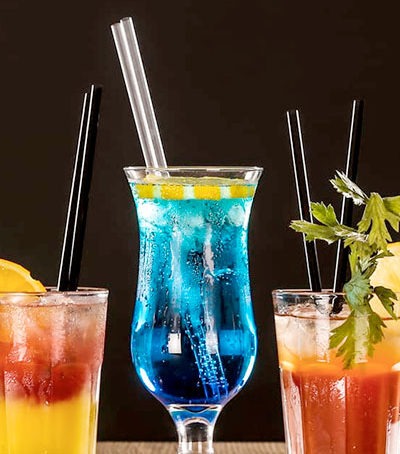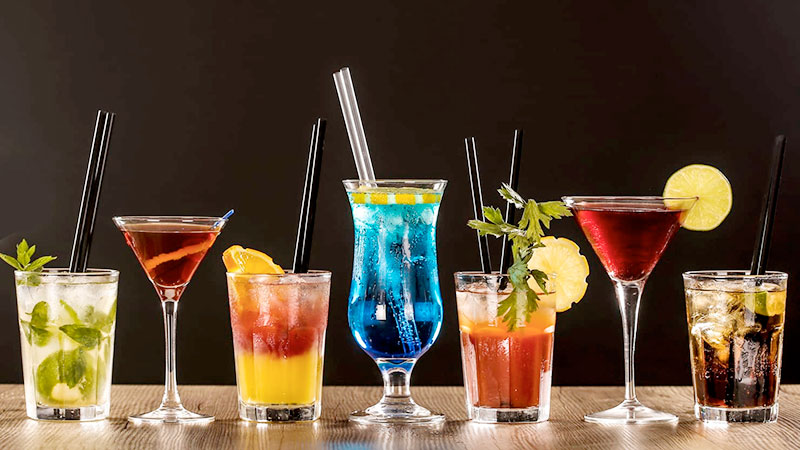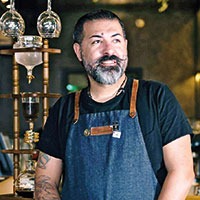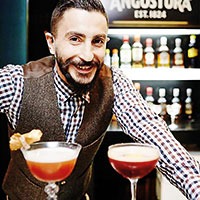In the F&B sector, chefs, baristas and mixologists have long been searching for ways to breathe life into classic dishes and drinks. The challenge has been to identify ingredients that are appealing in isolation, but can also work well together. HN delved deep into the world of syrups to discover more about how these essential ingredients are being used to create coffee and cocktail-based drinks that are capable of appealing to a mass and increasingly demanding audience


MADE TO ORDER
Stavros Lamprinidis, from Greece, is a lively, somewhat eccentric character whose passion for coffee has led to him winning more than half a dozen world coffee championships. As an authorized member of the Specialty Coffee Association (SCA), Europe, and a judge at HORECA 2018 Lebanese Barista Competition, he has traveled the world and brainstormed with coffee manufacturers, farmers and just about everyone working in the supply chain. Here, he gives his take, from the global coffee industry’s perspective, on the trend for using syrups in this popular beverage.
As a veteran of the coffee-making industry, what do you regard as the main changes that have taken place in the business and what has caused them?
Coffee-making has changed significantly over the past two decades. During the first wave, consumers wanted instant coffee, while in the second wave, commercial espressos dominated. Today, in the third wave, consumers not only want different types of specialty coffees, but are expecting their baristas, roasters and farmers to be more informed about the coffee they are handling. Furthermore, these same consumers insist on knowing more about where and how their coffee is sourced and made. This, in turn, has resulted in the offering of better quality coffees, despite the fact that we still have much to improve.
Consumers’ ever-changing tastes have driven various industries to introduce new concepts and flavors. Is this why adding syrup to coffee has become a popular practice?
It’s true that consumers are always looking for something new, which drives people in the food industry to accommodate demand. The use of syrups is one way to go about doing just that, especially when it comes to introducing novelties that may hold new appeal for consumers.
Is there a specific syrup flavor that doesn’t yet exist that you’d like to see produced?
According to industry sources, the big brands are hard at work creating an entire line of new flavors. On a personal note, the one flavor I would really like to see manufactured is tomato, while flavors and other ingredients that have worked well for me in the past are fruits, nuts, biscuits and herbs. When it comes to choosing any kind of syrup, the quality, freshness and amount of chemicals involved are central elements of consideration.

Stavros Lamprinidis, authorized member of the Specialty Coffee Association (SCA), Europe, and a judge at HORECA 2018 Lebanese Barista Competition

Anthony Bedoyan, general manager of La Marquise International in the UAE, Qatar and Oman
THE SYRUP REVOLUTION
Anthony Bedoyan, general manager of La Marquise International in the UAE, Qatar and Oman since 2004, has over 16 years of experience in the coffee profession. Prior to being elected as a board member of the SCA in the UAE/MENA, he served as judge at the UAE National Barista Competitions from 2010 onwards in the Barista and Latte Art Championships section, and at HORECA 2018 Lebanese Barista Competition. He also focuses on new coffee talents, organizes competitions, conducts training sessions and keeps abreast of all the new specialty coffee roasters in the region.
As sensory jury member of the 2018 Lebanese Barista Competition, what challenges have you witnessed?
One of the biggest challenges faced when it comes to this specific context is the quality of the single origin bean used by the baristas, simply because the higher the quality, the more flavorsome the outcome.
What are the main changes that have taken place in the coffee-making industry?
Coffee-making has changed dramatically in the past decade, specifically, the decrease in demand for commercial coffee and the increase, as well as evolution, of specialty coffee, which is growing at a phenomenal rate. This is mainly due to the desire among consumers to enjoy coffees that have distinctive characteristics and exotic flavors. Such growth has also been expounded by consumers’ ever-changing tastes and sense of discovery, driving various industries to introduce new concepts, flavors and mixes.
Does this explain the trend for adding syrup to coffee?
To be honest, I prefer to have my coffee without any additional ingredients or flavors as I enjoy the combination of sweetness, bitterness and acidity coffee presents to the taste-buds. However, with consumer trends, it’s highly popular to add or mix syrups to enhance the flavor of the coffee. It’s all about finding a good balance that everyone can appreciate and enjoy.
Is there a specific syrup flavor that doesn’t yet exist that you’d like to see produced?
I have been a resident of the UAE for many years now and have come to like dates, which are considered a fundamental part of the UAE’s heritage and identity, tremendously. As such, I have yet to find a brand that has mastered the precise taste of sweetness in any date syrup.
What are as some of the most interesting flavors of syrup that go well with coffee?
Off the cuff, I would say that popcorn and saffron are some of the most interesting syrup flavors that complement coffee-based drinks. If calibrated correctly, the taste is surprisingly pleasant. The trend of syrup flavors is here to stay. However, syrups are in higher demand when it comes to ‘mocktails’ (non-alcoholic cocktails), as well as regular cocktails, since these have a higher turnover. Some important factors to keep in mind when selecting a syrup brand is to make sure the syrup has a low percentage of sugar content, a high percentage of fresh ingredients and no added artificial colorings. Of course, the quality and source of the water used are also a key concern.
THE CRAFTY CRAFTSMAN
Lebanese bartender, Johnny Mansour, set a country first when he won second place at the Grand Finals of the Angostura Global Cocktail Challenge 2018 and best rum cocktail after winning first place in the Middle East and Africa championship. Throughout his 13 years of mixology experience, he’s garnered many awards and managed a large-scale with three different concepts. HN talks to the wizard about what’s currently causing a buzz in the business.
Are there any syrup brands specific to creating certain types of drinks?
While cocktails have many ingredients, like spirits, liqueurs and bitters, syrups are what really give the cocktail its unique flavor. For example, a Mai Tai, following the Trader Vic’s recipe, contains amber rum, dark rum, lime juice, Cointreau and Orgeat syrup. If the Orgeat syrup is substituted, the drink can no longer be considered a Mai Tai.
How do you go about selecting the syrup brands you use?
There’s a broad range of local and international syrup brands available to choose from. Some feature artificial flavors and coloring and others use natural extracts. Personally, I always use the ones with natural flavors, irrespective of where they are produced. In some cases, I even make my own syrups, like passion fruit syrup and spiced syrup, for example, because I haven’t found the exact taste that I need for some cocktails.
What role do syrups containing fresh ingredients play?
In some cocktails, the use of a fresh fruit muddle is recommended instead of a syrup, to give the cocktail a fresher taste. On the other hand, we sometimes face difficulties in finding seasonal fruits and in getting the same taste from the fruit all year round, which can affect the consistency of the cocktail and that makes using fruit puree a necessity. In general, when I select a syrup, I choose it based on how well it matches the cocktail being made, and in most cases, I go for more natural-flavored brands.
What strategy do you adopt, when customizing a drink using local dishes and ingredients?
The mixology field is evolving fast and mixologists around the world are becoming more creative in making new cocktails, introducing their twist on classics and using new flavors, such as popcorn. Sometimes, these twists are used to present the flavor of a culture or a country. For example, vodka sour has simple syrup as an ingredient. However, if you substitute this syrup with meghli or thyme syrup, you will have a different cocktail inspired by Lebanese culture. These examples show how the bartender is, at times, inspired by the flavors of a culture and also by the story behind the creation of a certain spirit. This is where creativity comes into play and a new drink or syrup is born.

Lebanese bartender, Johnny Mansour

Olga Cassidy, trade marketing manager MEIA at MONIN Studio Dubai
MONIN RIDES THE NEXT WAVE
Olga Cassidy, trade marketing manager MEIA at MONIN Studio Dubai, the makers of one of the favorite syrups among F&B professionals, talks to HN about the company’s key strengths and challenges, and what she expects to be the next big flavors to hit the market.
What can you tell us about the important role played by syrups in the preparation of various drinks?
Syrup is a key ingredient needed to create cocktails, whether it’s a classic mojito or a complex and unique signature cocktail. Bartenders are always looking for novelties and unexpected twists in classic drinks and that’s definitely where syrups come into play. To learn more about the role these play, we at Monin launched a research project last year, in close collaboration with top bartenders in Paris, London, Berlin, Dubai and Shanghai. We used what is called a perception map to understand what ingredients bartenders found indispensable for cocktail creation. When the results were in, we found that syrups came second after alcohol, followed by fresh fruits, cementing the role that syrup plays.
What is the added value a syrup brand like Monin brings to the table as opposed to other varieties?
Monin is the referent brand for bartenders and baristas worldwide. With more than 150 flavors in the current portfolio and innovative flavor launches twice a year, we offer plenty of opportunities for professionals to create drinks, depending on their needs and the time of day. Furthermore, Monin’s presence in 150 countries enables us to be aware of all the global F&B trends. We then use that insight as actionable data when proposing new relevant products that capitalize on the emerging trend.
Transparent labels, additives and colorings are a major concern for health-conscious customers. How is Monin tackling these demands?
We are well aware of this trend and natural ingredients are key. For this reason, Monin continuously strives to offer products made from natural ingredients, wherever possible. The finest ingredients are used in our syrups to demonstrate our unwavering commitment to quality. In addition, our products contain only pure cane sugar, which is a welcome alternative for a significant segment of health-conscious consumers, as opposed to glucose syrup. To provide a further alternative, we have created a range of sugar-free and low-sugar syrups and concentrates.
What are some of the top-trending flavors today and what’s behind their popularity?
The latest trend in bars is to offer vegetable cocktails, in addition to earthy and botanical flavors. This year, at HORECA Lebanon, we launched Le Fruit de MONIN Beetroot and Le Fruit de MONIN Carrot, and received a great response from visitors. Other trending flavors are within the spices category. Saffron, pink peppercorn and habanero, for example, were developed and offered by MONIN to only the top bartenders.
What flavors that have not yet been created would you like to see bottled?
One flavor that comes to my mind, which is proving quite challenging on many levels, is what Asians refer to as, ‘The King of Fruits’ – Durian. The difficulty relates directly to the pungent odor, which, if processed, would negatively affect the entire production line.

Anthony Andonian, winner of the Lebanese Bartenders Competition, HORECA 2018 Lebanon
HORECA’S 2018 WINNING COCKTAIL
As part of its annual program, HORECA Lebanon saw the crowning of Anthony Andonian winner of the Lebanese Bartenders Competition. Andonian is a full-time bartender at Sapa in Beirut, a Peruvian restaurant with a refined cocktail bar. HN talked to the winner about the secret behind the drink that netted him the crown.
“The mystery box of ingredients was called ‘Pandora’s Gift’, which reminded me of a story from Greek mythology. The moral of the story is about finding balance on earth. The same rule applies to making cocktails, which is not always easily achieved, especially when you only have 10 minutes and are required to use items you had no idea you would be working with. The box contained dehydrated kale, pickled turnips and pomegranate molasses! After muddling all of the above in a shaker, I added Jose Cuervo Tradicional, MONIN triple sec and to balance the sweetness, threw in MONIN rose syrup, which really suited the pomegranate taste. I then gave the mixer a good hard shake, strained it in a rimmed glass and topped it with black pepper and salt,” he revealed.















